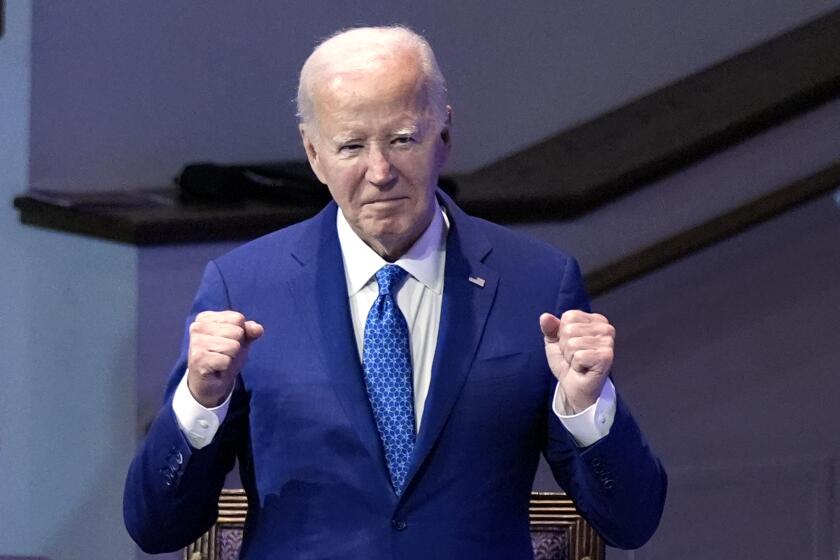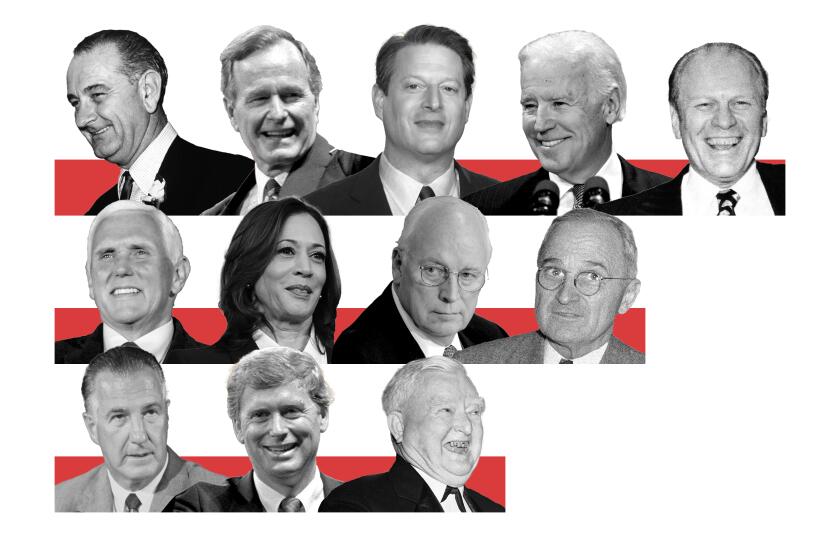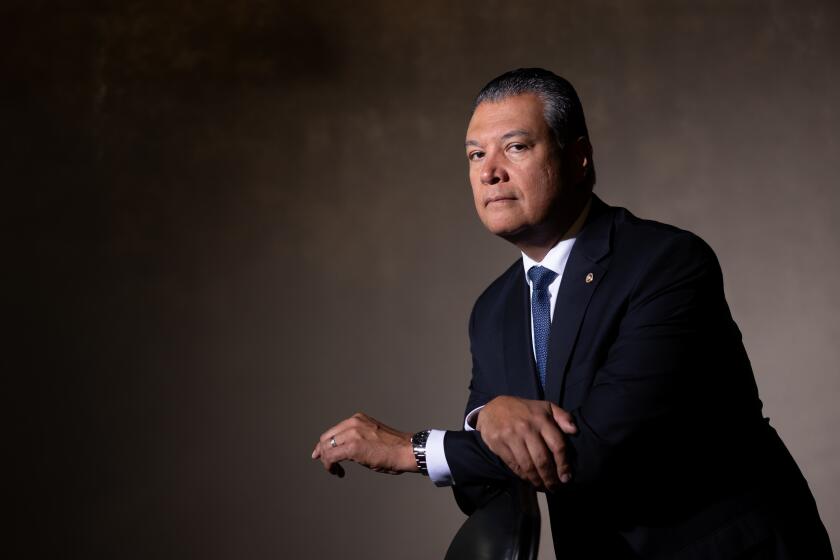James C. Corman; 10-Term Valley Congressman Championed Civil Rights, Welfare Legislation
Former Rep. James C. Corman, a liberal Democrat who represented the San Fernando Valley’s 21st Congressional District for 20 years and fought for tax reduction, welfare reform legislation and civil rights, including the 1964 Civil Rights Act, has died at the age of 80.
Corman, who lost his seat in one of the closest congressional elections in California history, died Saturday after suffering a stroke at a rehabilitation facility in Arlington, Va., said his wife, Nancy Breetwor-Malone.
Corman was “always very concerned about senior citizens and the poorest people in our society and making sure there was a real safety net,” said Rep. Howard L. Berman (D-Mission Hills), whose Valley district includes part of Corman’s old turf. “He stopped representing the San Fernando Valley 20 years ago, and to this day, when I’m in my district, people will ask me how Jim is doing,” Berman said.
The dapper, distinguished, silver-haired Corman served from 1961 to 1981--two tumultuous decades that saw the civil rights movement, the Vietnam War, urban riots, the Watergate impeachment hearings of President Nixon, major welfare and tax legislation, and the first manned flight to the moon.
Corman was one of 10 people named by President Johnson to the historic National Advisory Commission on Civil Disorders, informally known as the Kerner Commission for its chairman, Illinois Gov. Otto Kerner, to investigate the causes of multi-city rioting in the incendiary summer of 1967.
“I’m not so pessimistic to think that the situation is hopeless and that there is no reason for us to strive for an answer,” he said at a Van Nuys news conference in 1968 after the commission issued its report. “There is no logic in throwing up our hands and saying, ‘Well, we’re racists--there’s no hope for reform, so let’s forget it and arm ourselves and go to battle.’ I think there are constructive things that can be done.”
The same optimistic Corman made himself President Carter’s point man to push welfare reform through Congress in 1978, saying in a speech at the time: “We tend to think of welfare in terms of its impact on state government, but we should start from considering its impact on poor people. We should be asking, ‘What is it you want a woman with three children to have? What conditions are you going to apply on her to get it?’ ”
An extremely bright, intensely private and sometimes moody individual, Corman had no patience with critics who derided welfare recipients as lazy louts taking advantage of taxpayers.
“I don’t think there is anything uplifting about hunger,” the congressman once snapped. “I really think you need the physical fiber to support the moral fiber.”
If Corman devoted his greatest energy to the down and out, it may have been because he was once among them. He was the son of a Kansas silica miner who died of lung disease brought on by the work. The Depression forced the fatherless youth and his mother to seek a better life in California.
Corman served in the Marines during World War II, worked his way through UCLA and USC Law School, and practiced law.
In 1957 he won his first elective office as a Los Angeles city councilman. Three years later, east San Fernando Valley voters sent him to Congress.
A respected nuts-and-bolts legislator, Corman worked diligently within the political system, earning respect and seniority. He was named to the prestigious House Judiciary Committee, where he was instrumental in passing the 1964 Civil Rights Act sought by Johnson. Corman considered that legislation the greatest accomplishment of his life.
He became a ranking member, and was on his way toward becoming chairman, of the powerful House Ways and Means Committee, where he became a leading advocate for the poor and disadvantaged, working for tax and welfare reform.
And in 1976, Corman won membership in the joint House-Senate conference committee that helped resolve conflicts on bills as they wove through the separate sides of the Congress.
In urging reelection of the Van Nuys Democrat, The Times once editorialized: “[Corman] has served his constituents and his country with exceptional diligence and skill.”
But the congressional career of one of the last believers in Johnson”s “Great Society” came to a bitter and abrupt halt with the storied election of 1980. In that race, Corman faced his first serious opponent in conservative Republican housewife and anti-busing stalwart Bobbi Fiedler.
Corman, who supported busing only as a temporary, last-resort method to achieve school integration in Los Angeles, lost by 752 votes out of 153,770 cast, in one of the narrowest congressional races in state history.
Fiedler, who left Congress in 1987 after three terms and a failed Senate race, said of Corman on Tuesday: “He was a very far left-wing liberal. We were on opposite sides of the fence. . . . [But] he was a very skilled politician in those areas that he cared about: basically, increasing taxes to support welfare programs.”
Corman rued his narrow defeat, but made it clear he would never seek to return to Congress, knowing he couldn’t regain the seniority that had made him so influential.
“I will never run again,” he unequivocally told supporters shortly after Fiedler took his office in 1981. “I loved Congress and I hated to leave, but I’m looking forward now to doing something different.”
He never spoke negatively of Fiedler, and told that gathering: “It was a tough campaign, but I have no animosity. Still it makes me kind of sad to have lost on that [busing] issue.”
The veteran congressman blamed his defeat partially on Carter, whom he had staunchly and loyally supported, believing that Carter’s concession of defeat to Ronald Reagan before California polls closed prompted many Democratic voters to stay home.
Councilman Joel Wachs, a 30-year veteran of Los Angeles city politics whose district once overlapped Corman’s area, recalled that Corman proudly identified with the Valley.
“In mainstream political circles in Los Angeles, Jim always tried to call attention to the Valley,” Wachs said. “You just knew it when you talked to him--he was a Valley guy.”
Corman also cared deeply about working people and treated everyone with kindness and courtesy, Wachs said. “There was a genuine warmth there. It was just the old-fashioned kind of way of serving people.”
In recent weeks, California Democrats recalled Corman’s narrow defeat time and again as the presidential recount consumed Florida, said Rep. Nancy Pelosi of San Francisco.
“Jim Corman’s name was evoked so many times, and when it was it was not only about the election but also about losing such a talented and principled member of Congress,. . . ,” she said. “Jim Corman . . . continued to follow the work of Congress very closely. I think he longed to be here.”
Corman donated his voluminous congressional files to Cal State Northridge and moved on. He became a lobbyist in Washington, D.C., representing such clients as MCA, the U.S. League of Savings Institutions, the American Newspaper Publishers Assn. and the National Structured Settlements Trade Assn.
Corman had two children, Mary Anne and James C. “Chuck” Jr., with his first wife, Virginia Little, who died of cancer in 1966. His second and third marriages ended in divorces. He married accountant Breetwor-Malone in 1978 and with her had two more sons, Adam and Brian.
He is survived by his wife, his daughter and two younger sons, and one grandchild.
Services, with internment to follow, are scheduled at 9 a.m. Jan. 17, at Ft. Meyer Chapel at Arlington National Cemetery in Virginia. A memorial service in the San Fernando Valley is pending.
*
Times staff writer Sue Fox contributed to this story.
More to Read
Get the L.A. Times Politics newsletter
Deeply reported insights into legislation, politics and policy from Sacramento, Washington and beyond. In your inbox three times per week.
You may occasionally receive promotional content from the Los Angeles Times.






